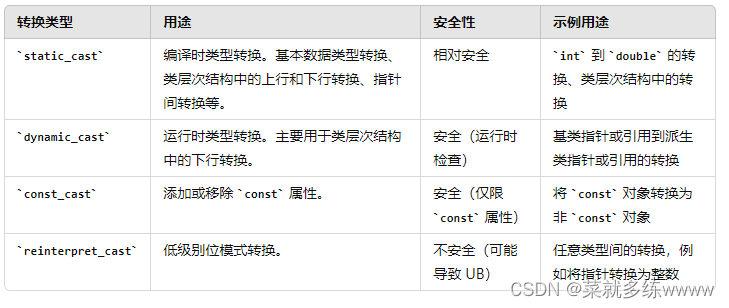在 C++ 中,主要有四种类型的显式类型转换(强制类型转换)运算符:
static_castdynamic_castconst_castreinterpret_cast
1. static_cast
static_cast用于在编译时执行显式类型转换。它可以用于大多数类型转换,如基本数据类型之间的转换、指针和引用之间的转换、类层次结构中的上行转换和下行转换(但不检查下行转换的安全性)。
1.1 语法:
static_cast<new_type>(expression)
1.2 示例:
#include <iostream>
int main() {
// 基本数据类型转换
int i = 10;
double d = static_cast<double>(i);
std::cout << "d: " << d << std::endl; // 输出: d: 10.0
// 类层次结构中的上行转换
class Base {};
class Derived : public Base {};
Derived derived;
Base* base = static_cast<Base*>(&derived);
// 基本数据类型转换指针
void* void_ptr = static_cast<void*>(&i);
int* int_ptr = static_cast<int*>(void_ptr);
std::cout << "*int_ptr: " << *int_ptr << std::endl; // 输出: *int_ptr: 10
return 0;
}
2. dynamic_cast
dynamic_cast主要用于在类层次结构中进行安全的下行转换(从基类指针或引用转换为派生类指针或引用)。它在运行时进行类型检查,如果转换不安全,将返回nullptr(对于指针)或抛出std::bad_cast异常(对于引用)。
2.1 语法
dynamic_cast<new_type>(expression)
2.2 示例
#include <iostream>
#include <typeinfo>
class Base {
public:
virtual ~Base() {} // 必须有虚函数以启用 RTTI
};
class Derived : public Base {};
class Unrelated {};
int main() {
Base* base = new Derived;
Derived* derived = dynamic_cast<Derived*>(base);
if (derived) {
std::cout << "dynamic_cast 成功" << std::endl;
} else {
std::cout << "dynamic_cast 失败" << std::endl;
}
base = new Base;
derived = dynamic_cast<Derived*>(base);
if (derived) {
std::cout << "dynamic_cast 成功" << std::endl;
} else {
std::cout << "dynamic_cast 失败" << std::endl;
}
delete base;
return 0;
}
3. const_cast
const_cast用于移除对象的const 和 volatile属性。它只能改变属性,不能用于其他类型转换。
3.1 语法
const_cast<new_type>(expression)
3.2 示例
#include <iostream>
void print(const int* p) {
// 使用 const_cast 移除 const 属性
int* modifiable = const_cast<int*>(p);
*modifiable = 20;
std::cout << "修改后的值: " << *p << std::endl;
}
int main() {
int i = 10;
print(&i); // 输出: 修改后的值: 20
return 0;
}
4. reinterpret_cast
reinterpret_cast进行低级别的位模式转换。它几乎可以转换任何类型的数据,但非常危险,不建议经常使用。使用不当可能导致未定义行为。
4.1 语法
reinterpret_cast<new_type>(expression)
4.2 示例
#include <iostream>
int main() {
int i = 65;
char* ch = reinterpret_cast<char*>(&i);
std::cout << "字符值: " << *ch << std::endl; // 输出: 字符值: A
return 0;
}
5. 总结























 677
677

 被折叠的 条评论
为什么被折叠?
被折叠的 条评论
为什么被折叠?








